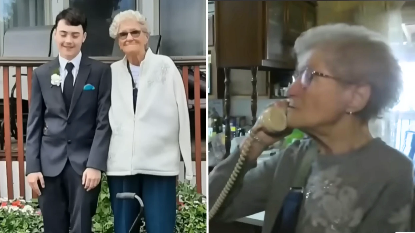Canadians are often labeled as polite and easygoing, but when it comes to protecting their loved ones, they can be fiercely sharp and clever. Just ask 84-year-old Mabel Harold.
When scammers tried to con her out of $8,000 by pretending her grandson was in jail, Mabel didn’t just take the bait — she turned the tables on them. Her story proves that you should never underestimate the power of a savvy grandma.
It was a typical Tuesday for 84-year-old Mabel Harold until a call turned her world upside down.
On the other end was a voice claiming her teenage grandson, Mitchell, was in jail and that she needed to send $8,000 to get him out. As a loving grandmother, Harold was distressed by the news and wanted to help. But something in the story didn’t sit right with her.
The caller spun a dramatic tale: Mitchell had been driving with friends when they were pulled over by the police, and drugs were found. The man insisted he was with the RCMP and demanded the money for bail. Harold’s heart raced as she listened, but her instincts told her to proceed with caution.
“I have grandchildren and not and it just kills me to think that sounds like that is happening to them. And I would do anything to help my grandchildren.”
– Mabel B. Harold
She decided to ask the caller a simple but clever question: “What’s my grandson’s last name?”
The caller’s hesitation spoke volumes. When he couldn’t answer, he became angry and hung up. Harold knew then that she had dodged a scam, potentially saving herself from significant financial loss and emotional trauma. She called her son, who confirmed Mitchell was safe at home, bringing relief after the scare.
This wasn’t the first time Harold was targeted by scammers. Just over a year earlier, she faced a similar situation. Another caller pretended to be her grandson, and an “RCMP officer” said she needed to pay $7,500 for his release. They even sent a taxi to her home to take her to the bank. Thinking it was a matter of life, death, and the law, Harold got in. But just as she was about to exit the taxi and walk into the bank, something clicked.
She asked the driver, “Who’s paying for this cab?” He replied that she would be paying for it. She was smart enough to know that if she didn’t call the cab and was expected to pay, this was far from official police business. That was all she needed to hear to turn around and go back home. Even though she paid the $20 fare, it was a small cost to save thousands.
Detective Sean Harding from the Financial Crimes Unit shared some tips for avoiding scams, emphasizing that it’s okay to hang up on suspicious calls. He warns that “three out of ten scam victims are likely to be targeted again, especially the elderly.”
He suggests following the “Ten and Two” rule: When faced with a suspicious request for money, take at least 10 minutes to think and discuss it with two trusted people before acting. This rule can help prevent impulsive decisions under pressure and allow time to recognize the warning signs of a scam.
Mabel Harold’s story underscores the importance of staying vigilant and trusting your instincts, even when the stakes seem high. Though she escaped both scams, the emotional toll was profound. “I got so sick, I couldn’t even get out of bed,” she admitted.
Her experience serves as a reminder to protect our most vulnerable loved ones and be prepared to recognize the tricks that scammers use. Her son’s words echo the sentiments of many: “Scammers should be all locked up.” It’s a call for greater awareness and stronger measures to combat fraud and protect those who are most at risk.
